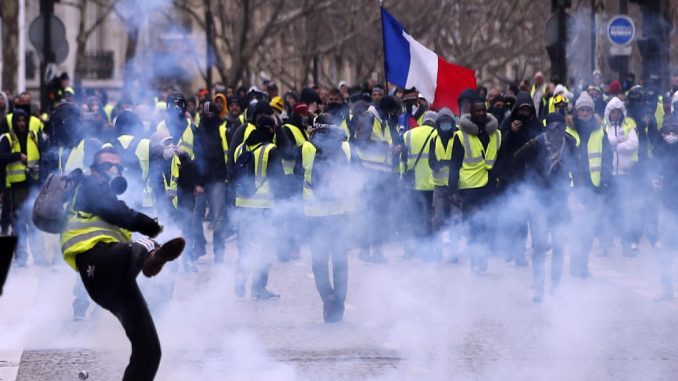
Whereas:
- The struggle of the yellow vests still thrives in France and impacts large sections of the working class and peoples around the world. It began in November 2018 against a fuel tax increase: a direct attack on the pockets of hundreds of thousands of workers, retirees, students and middle sectors who use their car every day.
- Along with the rejection of said increase, the movement´s claims were expanded to demand an increase in wages, pensions and social assistance and indexation; the improvement of transport and public services, the restoration of the wealth tax, the annulment of the VAT on products of mass consumption, the annulment of subsidies for employment to large companies, a limit in income of political officials, radical measures in response to the ecological emergency, a more direct democracy and even the resignation of Macron, “the president of the rich”.
- The movement arose spontaneously, outside the traditional trade union and political leaderships. It organizes with local assemblies, delegates elected by the base and a national “assembly of assemblies”, whose third meeting will take place in June. For six months, with ups and downs, every Saturday, tens of thousands mobilize throughout France, and there are strong clashes with repressive forces.
- Faced with the protest, Macron had to withdraw the fuel tax, freeze tariffs, increase the minimum wage and pensions, and opened a “great national debate” seeking to divert the movement. At the same time, he orders an unprecedented repression that has already killed two people, wounded dozens, detained hundreds and pressed charges against thousands; he approved an “anti-vandal” law and even threatened to deploy the army.
- The government’s campaign to discredit the yellow vests by associating them with the far right failed. Although the National Front expressed their support in the beginning, while the Socialist Party and the Communist Party criticized or hesitated, the movement became radicalized: it points to the government and the rich, not immigrants, as responsible for the crisis. Right wing groups have been thrown out of the marches several times.
- Despite the feet dragging of the CGT and other union bureaucracies, the yellow vests have been coordinating actions with the working class: on February 5, a first major march with strikes imposed by the rank-and-file; on March 19, a general strike with large mobilizations, on May 1 another mass demonstration and on May 9 in the state workers’ marches against the reform of their employment statutes. They also participated in environmental actions (such as the “March of the Century” on March 16), in anti-racist and women’s protests and mobilizations in support the Algerian revolution.
- Although some yellow vests are candidates in 4 of the 34 French lists, their statement on the European Union elections “does not support any specific vote or even participation in these elections” and proposes “to organize a campaign of information and awareness raising against the European institutions and their liberal policies” and to “ridicule this electoral masquerade”. On May 26, election day, together with the Belgian yellow vests, they will carry out a march in Brussels, to the headquarters of the EU.
- In their second national assembly, on April 7, they agreed on a call on the people to “create, together, by all necessary means, a new popular ecological social movement”, also stating that, “aware that we have to overthrow a global system, it is necessary to get rid of capitalism” and create a “power of the people, for by people and for the people “.
Considering:
- The struggle of the yellow vests does not only concern France, but goes against the same plans of austerity and privatization of our lives that the different capitalist governments apply on the workers and peoples of the whole world to make us pay for their crisis.
- Because of their just demands, their fighting methods and because of the enemy that they face, the struggle of the yellow vests has the sympathy of vast sectors of the workers’, youth, social and leftist vanguard at a global level.
- Because of the dynamic against the capitalist system that is posed by their movement, and especially by the harsh repression they face, they require the active support of all revolutionary organizations of the world.
The International Socialist League resolves:
- Launch an international solidarity campaign with the movement of the yellow vests, based on the main slogan “Yellow vests: the same fight, the same enemy. Macron, démission!”
- Each national section will publish regularly in its newspapers, web pages and social networks information about the development of the movement and, at the same time, of our campaign. In addition to supporting their demands, we especially demand: Freedom of all imprisoned demonstrators; total amnesty for all the defendants; prohibition of LBD weapons; compensation to all those injured by repression; repeal of the “anti-vandal” law.
- The culmination of the international campaign will be on November 17, one year after the beginning of the movement. On that day, each section will organize an event at the French embassy of their country, with yellow vests and posters or flags with the main campaign slogan.








